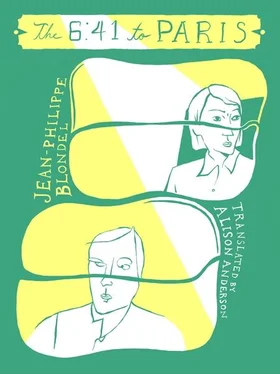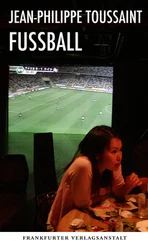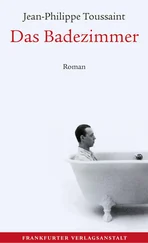All that disgust.
All the instances of disgust you experience simply by virtue of being a girl.
And that night, you added one more, Philippe Leduc.
A pretty significant one, too.
Never had I felt like such a burden.
Or so humiliated.
I started getting ready, in heavy silence. Outside, even London was asleep. I straightened my clothes, splashed some water on my face, checked that I had my documents, my train ticket, the money I needed. Very professional. I felt like I was in a film, one of those black-and-white thrillers where the heroines sleep in motels and then disappear. I didn’t feel a thing, other than an anticipation of fatigue, because it was 3:30 in the morning and I had to walk all the way to Waterloo Station, a long way, and the city at that time of night would be full of boys on motorcycles wanting to follow me. As I left the room I managed to call out, trying hard to make my voice sound bright, “Have a nice evening!” but I knew that for them, too, everything had been ruined. The girl was acting blasé, but beneath her makeup and her getup, she was worried. About me. She was wondering where I would go like that. She was drawing a kind of parallel between me and herself. A sisterhood. The word almost made me smile. As I walked by her, I whispered, “I’m not his sister, you know.” But she already knew that — of course she knew. She had figured it all out.
Suddenly I was out in the street.
It was balmy, a horribly pleasant night.
London in July. If I’d been a smoker, I would have lit a cigarette.
I sat down on the bench across from the hotel and said, out loud, “Two minutes!”
Two minutes to catch my breath. Two minutes to change my life, too. And then, of course, I burst into tears. I was instantly annoyed with myself. I didn’t want to be the caricature of the girl who’s been dumped and goes to pieces. I didn’t want to be like anyone, anymore. What I really wanted from then on was dignity and respect, and to be capable of insolence and determination.
I was sick and tired of being the ant.
I thought I’d try to find a place to spend the rest of the night — go to a park, walk through the damp grass, find refuge in a bush or under a tree, spread my towel for a mattress, use my backpack as a pillow, curl up and hope no one would approach me or attack me, and try to relax while I listened to the birds’ waking song.
But once I started walking, I knew it wouldn’t work out like that. As I walked through those London streets everything began to make sense. That girl’s expression for a start, straight out of an American movie; then Philippe Leduc’s, downcast, eyes averted. It was ridiculous. I sensed that I had to take it from there. That moment would be the sandbank — or shoal, rather — on which I had run aground, and now I would have to kick my heel against it to rise back up to the surface.
I built myself a future.
First of all, I would finish my studies: I’d been on the verge of letting them drag on and on, or of dropping them altogether, and they would have led nowhere. Now I would start learning, and then I’d learn some more. I would stop being the student who just scrapes by with average grades, and about whom people said, when they looked at the list of students who’d been promoted, “Huh, she actually passed?”
I would change where I lived, too — I’d move to a big city, where opportunities would be real and careers didn’t lead down some dead-end street. To a place where I could still meet people by chance.
And above all, I would never allow myself to be impressed.
No matter the age, gender, history, or social position of the people I met, I would immediately treat them as equals. Human beings with the same genetic heritage — vulnerable to viruses, prone to sudden illness during a romantic weekend in Amsterdam, capable of humiliating a girl by bringing another one up to the room, and probably concealing a secret life, full of inadmissible vices, moments of distress, grimaces in the mirror, and disgust.
Then there were my looks, obviously.
Change things: a concession I had never wanted to make until now. Start using the makeup kits I sometimes bought but rarely opened, as if they weren’t meant for me, as if I didn’t deserve them.
Go to the hairdresser’s. Get one of those boyish cuts that were suddenly cropping up in the photos in hairdressing salons.
Do something about my wardrobe.
Oh yes, my wardrobe.
Throw out anything shapeless, all-purpose, beige, brown, sea-green, gray, or blue. Start trying bright colors, accentuate the red, yellow, and orange, learn to stand out.
If I close my eyes, I can still see those London streets, that sweltering July night.
Of course I passed a few night owls, but they didn’t notice me. Just wait a few years, I thought, and then they’ll turn around when I go by. At one point I got lost on my way to Waterloo. I went in circles for a few minutes. Twice walked past the only store whose display windows weren’t protected by iron shutters. A boutique that sold herbs, and face creams made from plants, and makeup that was one hundred percent natural. It seemed ever so amateurish, like some holdover from the seventies, people living in communes — completely out of sync with the triumphalist eighties, a rotten tooth that needed pulling. It suddenly occurred to me: if I were in charge of that store, I would organize everything differently, make it modern, make it popular. No, not popular, better than that. Trendy. Upmarket.
For thirty seconds or so I saw through to my future — and then the door slammed shut. It took me more than fifteen years to open it again. They weren’t lost years. It took me that long to come to terms with everything I was feeling that night.
A desire for revenge; pride, determination, and even a sort of feverish joy. A joy that vanished the minute the sun came up. A joy which, on the train home, gave way to that electrifying hatred. Which spread all through my body. A hatred which left a lasting trace. A hatred which, much later, only Luc managed to extinguish — even though, in the beginning, all I wanted was to seduce him, the better to drop him not long afterward. To leave him reeling. Gasping. Needy. Like all the others, after Leduc and before Luc, whom I had unceremoniously dumped.
I never went back to London. I’ve visited half the planet, and I’ve always taken great care to avoid the United Kingdom.
Would I be ready to go back there now?
Would I be ready to forgive?
It still gets to me.
I may claim that it doesn’t. That it’s just some unpleasant memory I can brush aside. That would be true, too. I don’t dwell on it. But there are times when that night comes back to me. I’ll be shaving, looking in the mirror, telling myself I’ve gone downhill, that I look like an obese, wrinkled caricature of Hugh Grant in Four Weddings and a Funeral —and my mind wanders as I pull at my skin, and the razor tries to restore a semblance of youth to my cheeks and my neck. Then all of a sudden, my lips pucker with a bitter taste. I can see myself outside the stadium in Aube, I’m twelve years old, and I’ve just made Karima cry, telling her that I don’t talk to foreigners. Or I’m sixteen and I’ve just told off a classmate because he’s worried about his mother, the chemo is really rough going, and I shouted at him that he was a pain, couldn’t he stop making such a big deal out of it? I don’t know what came over me. Then I’m twenty, there are two girls in a hotel room, it’s dead quiet, and one of them walks past the other and says, “I’m not his sister, you know.”
What do other people do to forget?
One day I started looking to see if there wasn’t some sort of group therapy, an Alcoholics Anonymous type meeting, where everyone would sit and hold hands and say their name — hello, I’m Philippe — and where you could off-load your most shameful memories. I couldn’t find anything. Maybe I didn’t look hard enough. That’s my problem, after all. I don’t look hard enough. I wait for the fruit to fall fully ripened from the tree. Stewed. For a while, it worked. But now I lack confidence in myself. No, that’s not exactly it, either. I don’t trust myself. That’s why I’m going to see Mathieu at the hospital.
Читать дальше












